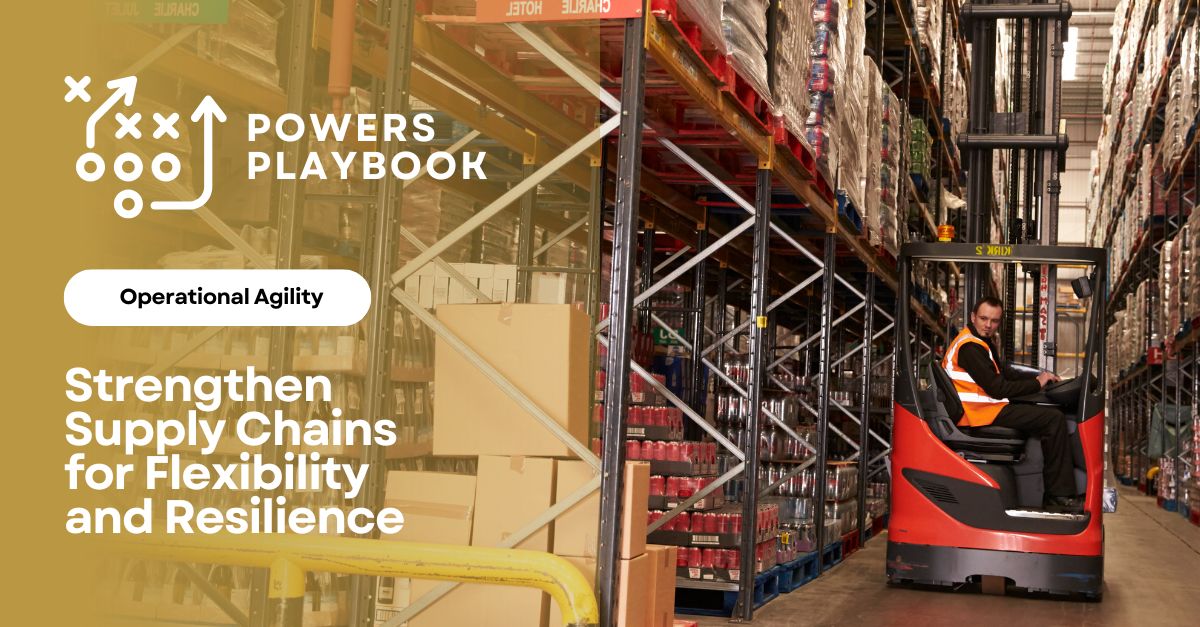
Robust supply chains enable U.S. manufacturers to anticipate, manage, and recover from disruptions such as tariff increases, geopolitical shifts, or material shortages, while maintaining fluid operations and controlling costs.
Global supplier challenges make supply chain strength essential for operational agility and long-term resilience, allowing firms to adjust production, meet shifting demand, and maintain profitability. Strong supply chains can enhance efficiency, minimize downtime resulting from disruptions, and expedite recovery, thereby freeing capacity for innovation and fostering customer trust through reliable deliveries. Addressing supply chain weaknesses is crucial to staying competitive amid labor shortages and rising costs.
This playbook offers practical, low-disruption steps to bolster supply chains, enhancing operational flexibility for U.S. manufacturers without requiring major overhauls or significant investments.
Identifying Supply Chain Weaknesses
Look for these signs of supply chain frailties that hinder operational flexibility:
- Single-Source Reliance: Dependence on one supplier, risking halts if they face disruptions.
- Delayed Data Access: Manual tracking or slow reports, leading to higher inventory costs due to overstocking or shortages.
- Sluggish Recovery: Prolonged downtime from disruptions due to uncoordinated supplier responses.
- Disconnected Teams: iloed internal teams or weak supplier communication, causing longer lead times during demand spikes.
These frailties can reduce operational efficiency, increase risks, and limit adaptability.
Actionable Steps to Implement Now
1Evaluate Supply Chain Vulnerabilities
Map your current network to identify weak points and focus on strengthening those areas.
- Catalog all suppliers, including tiers 2 and 3, and assess their geographic locations and dependency levels.
- Use risk matrices to evaluate factors such as political stability, supplier reliability, and delivery performance, based on historical data.
- Involve cross-functional teams (procurement, operations, finance) in workshops to simulate disruption scenarios and identify critical vulnerabilities.
This initial step uncovers hidden risks, enabling targeted improvements that can reduce disruption impacts.
2Broaden Supplier Networks and Prioritize Nearshoring
Reduce dependence on single sources by creating a diversified supplier base.
- Source alternative suppliers in stable regions, favoring nearshoring options like Mexico or Canada to cut lead times amid U.S. tariff pressures.
- Negotiate flexible contracts with volume commitments across multiple vendors, starting with non-critical materials to test reliability.
- Conduct thorough due diligence, including site visits or virtual audits, to ensure new partners meet the required quality standards.
This diversification reduces single-point failures, boosting flexibility for rapid sourcing adjustments during global events.
3Adopt Real-Time Tracking Solutions
Use technology to gain complete transparency and proactive oversight.
- Deploy IoT sensors and analytics platforms to monitor shipments, inventory levels, and supplier performance in real-time.
- Incorporate blockchain for secure, tamper-proof data sharing, enabling faster detection of issues like delays or quality deviations.
- Set up dashboards with automated alerts for anomalies, such as cost spikes due to tariffs, and train teams to interpret the data for swift decision-making.
This tech integration delivers predictive insights, cutting response times to disruptions and optimizing inventory.
4Establish Cooperative Risk Mitigation
Build partnerships and internal processes to strengthen your collective capabilities.
- Hold joint planning sessions with key suppliers to align on contingency plans, such as shared inventory buffers or co-developed continuity strategies.
- Form cross-functional response teams with defined roles for scenarios like supply shortages, incorporating regular drills to practice activations.
- Include resilience metrics in supplier scorecards, rewarding partners for proactive measures like dual-sourcing.
This cooperative approach strengthens relationships, speeding up recovery and aligning the chain for flexible operations.
5Track Progress and Refine Strategies
Monitor improvements and adjust strategies based on data.
- Define KPIs such as supplier diversification ratio, average recovery time, and cost volatility index, tracking them via analytics tools.
- Conduct quarterly reviews to assess performance against established benchmarks, incorporating feedback from team members and suppliers.
- Scale effective tactics, such as expanding nearshoring, while adapting to trends like regulatory changes or material cost fluctuations.
This continuous cycle ensures lasting improvements, enhancing overall OEE and adaptability.
The Payoff
Supply chain frailties expose operations to unpredictable shocks, undermining flexibility and profitability. Implementing these practical steps transforms your network into a robust, adaptable asset, empowering teams to handle uncertainties with confidence.
About POWERS: Your Partner in Operational Excellence
POWERS equips manufacturing leaders to master supply chain challenges through expert process optimization, cultural alignment, and hands-on management strategies. With decades of cross-industry expertise, we deliver comprehensive assessments and practical solutions to build agile, resilient supply chains that drive productivity and profitability. Our approach ensures your operations can pivot swiftly, maintaining flexibility in volatile markets.
Take the Next Step Toward Supply Chain Strength
- Speak to an Expert: Call +1 678-971-4711 to discuss your specific challenges and goals.
- Email Us: Get tailored insights by emailing info@thepowerscompany.com
- Request an Assessment: Use our online contact form, and one of our expert manufacturing consultants will reach out to schedule an in-depth analysis of your operations.

